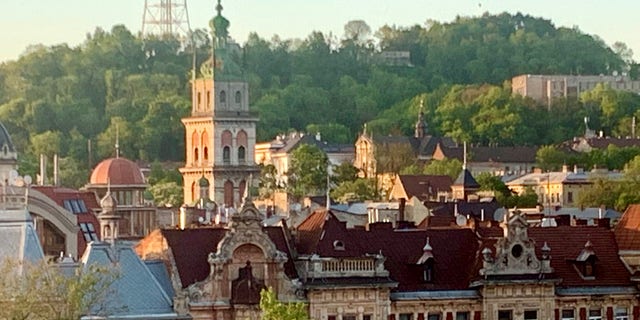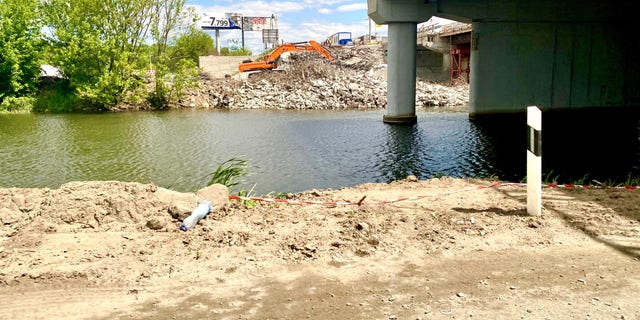Reporter’s Notebook: Putin’s war continues, but Ukrainian spirits are still high
Driving through western Ukraine there’s little evidence of war, yet the threat of attack from Russian cruise missiles is constant. Military checkpoints are everywhere, usually constructed of old tires and sandbags, the Ukrainian blue and yellow flag fluttering proudly in gentle spring breezes, mirroring the sky and golden fields or rapeseed that stretch to the horizon.
I’d describe Lviv as a combination of Paris and Rome – its cobblestone streets lined with stately homes over which tower the spires and domes of ancient churches. It’s a city that’s enjoying spring, even in the midst of conflict. Having been here in the cold depths of winter when refugees arrived by the thousands at the train station and people hunkered down in anticipation of Russian attack, it’s surreal to see the city come back to life. The trees are green, the gardens blooming and the cafés and restaurants doing a brisk business.

When I was last here a pair of pigeons were in the beginning stages of building a nest in the eaves of the building across from my hotel room. Every day they would busily bring twigs and branches, weaving them together. Six weeks later they nestle upon their new home, oblivious to the war. That’s not to say there aren’t air raid sirens, and authorities constantly remind residents to remain vigilant.
44 CIVILIANS FOUND DEAD UNDER BUILDING DESTROYED BY RUSSIAN FORCES KHARKIV: OFFICIALS
My stay in Lviv was very brief, only one night. Given that Ukrainian forces are currently pushing the Russians back, I departed for Kyiv, traveling by car through the countryside. The roads are very quiet, practically empty but for trucks hauling their loads toward the capital. Due to the war there’s a shortage of gasoline and diesel and the few petrol stations that have fuel have long lines – many waiting hours to fill their empty tanks. Even 150 miles from Kyiv there are checkpoints manned by camouflage-clad soldiers. They gave our vehicle a cursory glance before waving us onward.

Approaching Kyiv, you begin to see the first signs of conflict. Not far from Irpin and Bucha, suburbs that bore the brunt of Russian artillery and fierce fighting, buildings lay in ruins, pockmarked with bullets. What remains of an industrial building is a testament to the bombing this area sustained, its steel beams twisted, and its walls charred from a direct hit. Nearby businesses and homes had all their windows blown out, but even here, where so many lost everything, there are signs of life. I saw several people working in their gardens, shovels in hand as they tended to their vegetables.
McCONNELL MAKES SURPRISE TRIP TO MEET ZELENSKYY IN UKRAINE
Just a few short miles later and Kyiv could be seen in the distance, an indication of just how close the Kremlin came to taking the capital. Most of the bridges were purposely blown up by the Ukrainians to stall any advance, but reconstruction is already underway. In the meantime, cars negotiate a rutted dirt path and drive over a temporary bridge to access the remaining highway into the city.
CLICK HERE TO DOWNLOAD FOX NEWS APP
Much like Lviv, once you’re in Kyiv life appears surprisingly normal with minimal signs of damage. Hedgehogs, welded steel barriers designed to stop tanks, sit unused on the sidewalk near Maidan in the central part of the city. Sandbags continue to line the entrance to the subway where residents who stayed sought shelter. Kyiv is slowly returning to a new normal, all eyes to the east where fighting continues, but with a growing belief that ultimately Ukraine will prevail.

At a small supermarket the shelves are well stocked with supplies, though fresh produce is limited. Despite the threat of war there was never any panic buying. People bought what they needed and nothing more, mindful of others. There was always a sense of unity, the understanding they were all in this together. During the 10 weeks I spent here at the beginning of the war I witnessed endless acts of kindness, people opening their homes to strangers who had no place else to go. War brings out the worst in people, but it also brings out the very best.
Andrew Fone is a Fox News field producer.
Read the full article Here


